Gage Hills
Lifetime-Aware Design of Item-Level Intelligence
Sep 09, 2025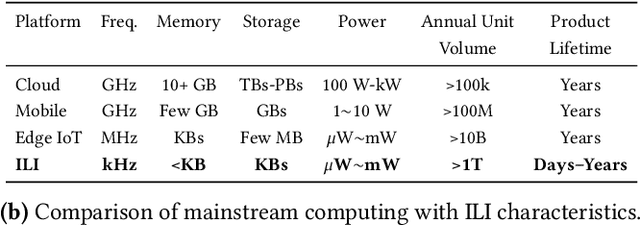


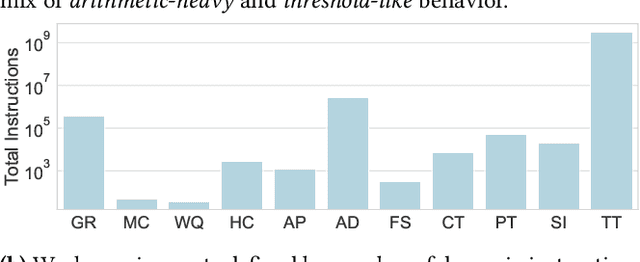
Abstract:We present FlexiFlow, a lifetime-aware design framework for item-level intelligence (ILI) where computation is integrated directly into disposable products like food packaging and medical patches. Our framework leverages natively flexible electronics which offer significantly lower costs than silicon but are limited to kHz speeds and several thousands of gates. Our insight is that unlike traditional computing with more uniform deployment patterns, ILI applications exhibit 1000X variation in operational lifetime, fundamentally changing optimal architectural design decisions when considering trillion-item deployment scales. To enable holistic design and optimization, we model the trade-offs between embodied carbon footprint and operational carbon footprint based on application-specific lifetimes. The framework includes: (1) FlexiBench, a workload suite targeting sustainability applications from spoilage detection to health monitoring; (2) FlexiBits, area-optimized RISC-V cores with 1/4/8-bit datapaths achieving 2.65X to 3.50X better energy efficiency per workload execution; and (3) a carbon-aware model that selects optimal architectures based on deployment characteristics. We show that lifetime-aware microarchitectural design can reduce carbon footprint by 1.62X, while algorithmic decisions can reduce carbon footprint by 14.5X. We validate our approach through the first tape-out using a PDK for flexible electronics with fully open-source tools, achieving 30.9kHz operation. FlexiFlow enables exploration of computing at the Extreme Edge where conventional design methodologies must be reevaluated to account for new constraints and considerations.
Hardware-in-the-Loop for Characterization of Embedded State Estimation for Flying Microrobots
Nov 10, 2024



Abstract:Autonomous flapping-wing micro-aerial vehicles (FWMAV) have a host of potential applications such as environmental monitoring, artificial pollination, and search and rescue operations. One of the challenges for achieving these applications is the implementation of an onboard sensor suite due to the small size and limited payload capacity of FWMAVs. The current solution for accurate state estimation is the use of offboard motion capture cameras, thus restricting vehicle operation to a special flight arena. In addition, the small payload capacity and highly non-linear oscillating dynamics of FWMAVs makes state estimation using onboard sensors challenging due to limited compute power and sensor noise. In this paper, we develop a novel hardware-in-the-loop (HWIL) testing pipeline that recreates flight trajectories of the Harvard RoboBee, a 100mg FWMAV. We apply this testing pipeline to evaluate a potential suite of sensors for robust altitude and attitude estimation by implementing and characterizing a Complimentary Extended Kalman Filter. The HWIL system includes a mechanical noise generator, such that both trajectories and oscillatinos can be emulated and evaluated. Our onboard sensing package works towards the future goal of enabling fully autonomous control for micro-aerial vehicles.
Carbon Connect: An Ecosystem for Sustainable Computing
May 22, 2024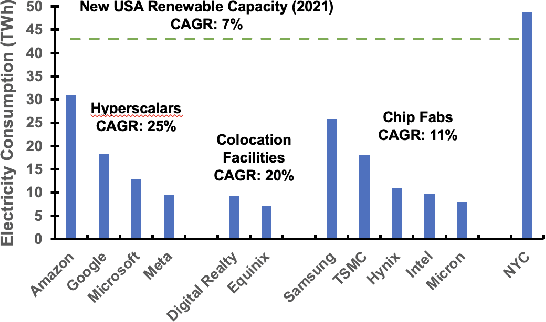
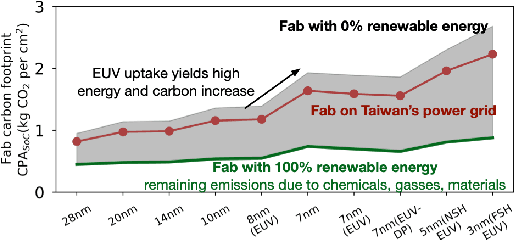
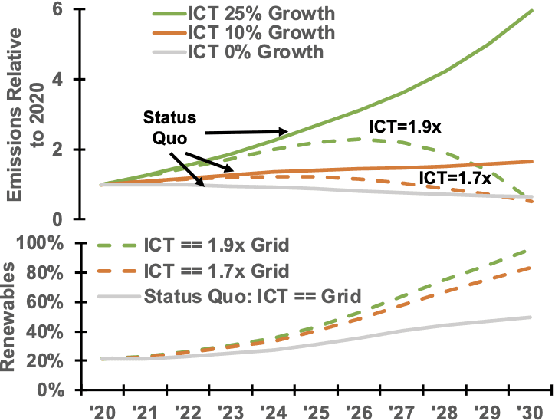
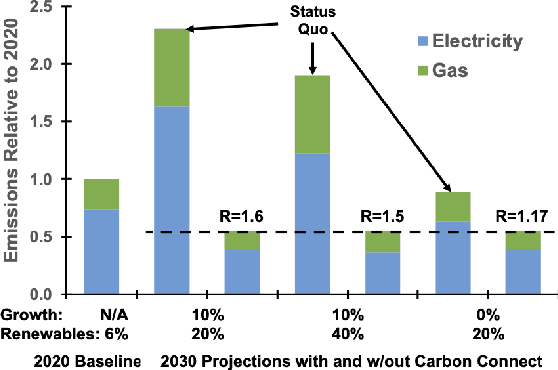
Abstract:Computing is at a moment of profound opportunity. Emerging applications -- such as capable artificial intelligence, immersive virtual realities, and pervasive sensor systems -- drive unprecedented demand for computer. Despite recent advances toward net zero carbon emissions, the computing industry's gross energy usage continues to rise at an alarming rate, outpacing the growth of new energy installations and renewable energy deployments. A shift towards sustainability is needed to spark a transformation in how computer systems are manufactured, allocated, and consumed. Carbon Connect envisions coordinated research thrusts that produce design and management strategies for sustainable, next-generation computer systems. These strategies must flatten and then reverse growth trajectories for computing power and carbon for society's most rapidly growing applications such as artificial intelligence and virtual spaces. We will require accurate models for carbon accounting in computing technology. For embodied carbon, we must re-think conventional design strategies -- over-provisioned monolithic servers, frequent hardware refresh cycles, custom silicon -- and adopt life-cycle design strategies that more effectively reduce, reuse and recycle hardware at scale. For operational carbon, we must not only embrace renewable energy but also design systems to use that energy more efficiently. Finally, new hardware design and management strategies must be cognizant of economic policy and regulatory landscape, aligning private initiatives with societal goals. Many of these broader goals will require computer scientists to develop deep, enduring collaborations with researchers in economics, law, and industrial ecology to spark change in broader practice.
 Add to Chrome
Add to Chrome Add to Firefox
Add to Firefox Add to Edge
Add to Edge